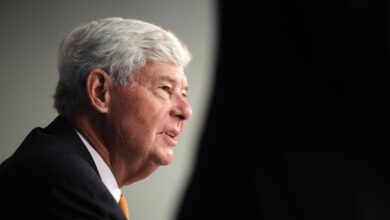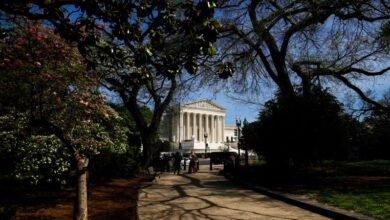Gov. Ron DeSantis signs education bill limiting book challenges

Less than a year after signing a law that led to the removal of hundreds of books from public school shelves, Florida Gov. Ron DeSantis signed a bill Tuesday that amends the state’s law to limit the number of books and classroom materials that can be challenged in school districts.
The bill, which goes into effect on July 1, states that Florida residents without children in a school district “may not object to more than one material per month” and instructs the state’s Board of Education to adopt changes to implement the decision.
The provision does not limit the number of challenges a parent with a child enrolled in a Florida school district can file or include a penalty if the law is violated.
DeSantis on Tuesday acknowledged that some school districts in the state may have gone too far in removing titles from classrooms.
“You have some people who are taking the curriculum transparency, and they are trying to weaponize that for political purposes,” he said at an event in Jacksonville, Florida. “That involves objecting to normal books, like some of the books that I saw in the teacher’s lounge, these classic books.”
In the first half of the 2023-2024 school year, Florida had the highest number of bans compared to other states, a report released Tuesday by the literary and free expression advocacy group PEN America found.
There were 4,349 instances of book bans in 23 states and 53 public schools from July to December 2023, but PEN America says 3,135 of those bans impacted 11 school districts in the Sunshine State.
More than 1,600 cases were from a single school district, Escambia County Public Schools, which is facing a lawsuit in connection to the book removals, CNN previously reported.
In February, during a news conference near Orlando, the governor called on Florida’s Department of Education to “take appropriate action to prohibit bad actors in school leadership positions from intentionally depriving students of an education by politicizing the book review process.”
He called the idea that Florida bans books a “false narrative.”
But across the state, school board meetings have become a battleground between parents who want certain books removed and those who wish to have them remain available to students. Meanwhile, Florida teachers and educators have struggled to navigate a slate of laws signed by the governor that expand so-called “parental rights” in schools.
In 2023, DeSantis signed HB 1069, which restricts sexual education and classroom “instruction on sexual orientation and gender identity in Pre-K through 8th grade.”
The legislation also allows parents and citizens to petition for classroom books and instructional materials that include “pornography” or describe sexual conduct to be removed. Individual school districts are responsible for creating processes “to handle all objections” and provide resolutions, the law states.
Since the law went into effect last year, residents have swiftly objected to a number of books, and individual school districts were left to develop a process to determine whether the challenged material would be restricted to a certain age group or removed from schools altogether.
Despite the removal of hundreds of books from school shelves in the last school year, DeSantis maintains Florida does not ban books in schools, but he has acknowledged that “some people have abused this process.”
“If you’re somebody who doesn’t have a kid in school and you’re gonna object to 100 books, no, I don’t think that’s appropriate,” DeSantis said at a news conference in February.
Sabrina Baêta, manager of PEN America’s Freedom to Read program and a lead author of Tuesday’s report, said the findings should be a red alert for those who care about American values and free expression.
“Book bans are targeting narratives about race and sexual identities and sexual content writ large, and they show no sign of stopping. The bans we’re seeing are broad, harsh, and pernicious – and they’re undermining the education of millions of students across the country,” Baêta said in a statement.
When it comes to how many books are banned at public schools, Florida takes the lead, followed by Wisconsin, which had 481 bans in three school districts; Iowa with 142 bans in three districts and Texas with 141 bans in four districts. Kentucky and Virginia reported at least 100 bans, according to the PEN America report.
After analyzing the book ban instances, PEN America found several trends regarding the content of the books and the people involved or impacted by the bans.
Books that discuss sex, abortion or rape are among the most censored after claims that their content considered sexually explicit or “obscene” – a category of speech that is not protected under the First Amendment, according to the report. PEN America said there is no consistent legal definition of what is considered sexually explicit from state to state, “leading to confusion about what is and is not allowed.”
Other books that continue being targeted are those discussing race, racism and LGBTQ+ themes, especially transgender identities and experiences, PEN America said.
Get Best News and Web Services here







